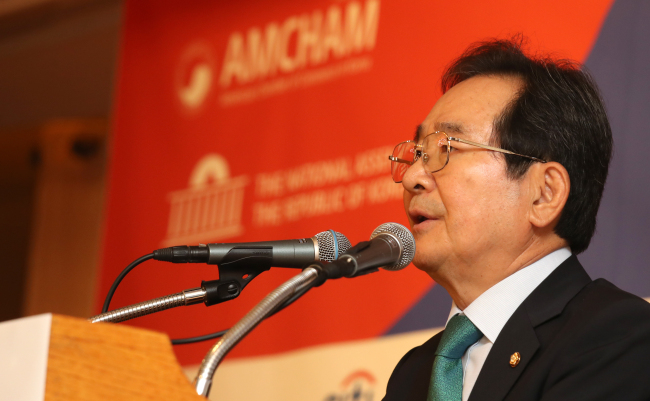S. Korea's parliamentary speaker makes thinly veiled defense of THAAD
By YonhapPublished : Aug. 24, 2017 - 22:05
South Korea's parliamentary speaker on Thursday made a thinly veiled defense of Seoul's move to host a US missile defense system, saying all countries have the right to take "self-defense" measures against external threats.
During his remarks at an event celebrating the 25th anniversary of the establishment of diplomatic ties between South Korea and China, Chung Sye-kyun also called for joint efforts to remove the root cause of the threats, alluding to the North's nuclear and missile programs.
"Every sovereign state has the right to take self-defense steps to cope with external threats," Chung said.

"Rather than getting embroiled in arguments over the responses (to the threats), it is time for us to muster up our power and wisdom to do away with the cause. When the cause disappears, there will naturally be no need for such measures," he added.
The issue of deploying a Terminal High-Altitude Area Defense
(THAAD) battery in the South has been a thorn in the Seoul-Beijing relationship. Beijing argues it undermines its security interests, while Seoul and Washington say it is a purely defensive weapon that only targets the North.
The full-on THAAD deployment has been suspended amid an environmental impact assessment. The new Seoul government believes the assessment process is a legitimate domestic procedure, though concerns remain it could delay the installation amid escalating threats from the North.
During the congratulatory event, Chung also voiced hopes that Seoul and Beijing can work together to open a "new era" for an integrated Eurasia through their respective policy initiatives such as the former's Eurasia Initiative and the latter's One Belt, One Road drive.
Both initiatives seek to enhance connectivity among countries on the Eurasian continent through major infrastructure and transportation schemes. But political uncertainties stemming from North Korea have apparently undermined the regional integration
efforts. (Yonhap)



![[AtoZ into Korean mind] Humor in Korea: Navigating the line between what's funny and not](http://res.heraldm.com/phpwas/restmb_idxmake.php?idx=644&simg=/content/image/2024/04/22/20240422050642_0.jpg&u=)

![[Exclusive] Korean military set to ban iPhones over 'security' concerns](http://res.heraldm.com/phpwas/restmb_idxmake.php?idx=644&simg=/content/image/2024/04/23/20240423050599_0.jpg&u=20240423183955)

![[Herald Interview] Why Toss invited hackers to penetrate its system](http://res.heraldm.com/phpwas/restmb_idxmake.php?idx=644&simg=/content/image/2024/04/22/20240422050569_0.jpg&u=20240422150649)
![[Graphic News] 77% of young Koreans still financially dependent](http://res.heraldm.com/phpwas/restmb_idxmake.php?idx=644&simg=/content/image/2024/04/22/20240422050762_0.gif&u=)







![[Exclusive] Korean military to ban iPhones over security issues](http://res.heraldm.com/phpwas/restmb_idxmake.php?idx=652&simg=/content/image/2024/04/23/20240423050599_0.jpg&u=20240423183955)



![[Today’s K-pop] Ateez confirms US tour details](http://res.heraldm.com/phpwas/restmb_idxmake.php?idx=642&simg=/content/image/2024/04/23/20240423050700_0.jpg&u=)